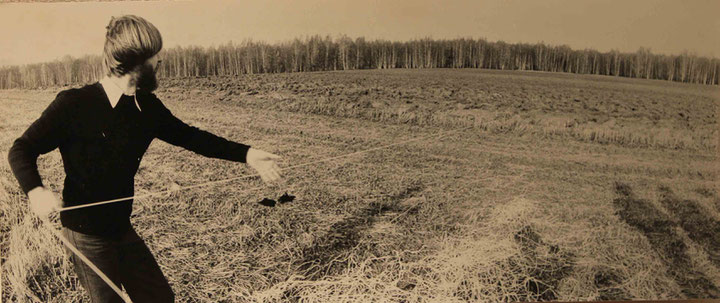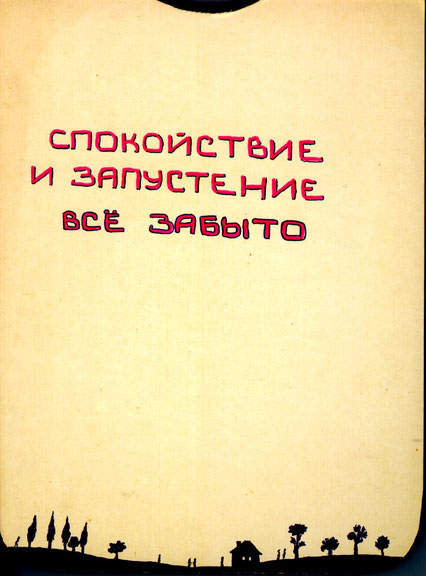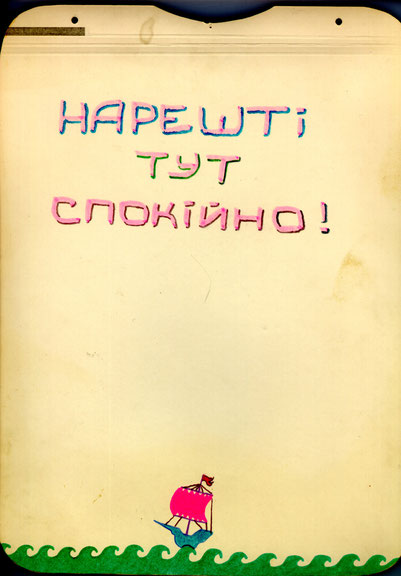It so happens that our age is not going to pieces or rotting, but rather is approaching its inevitable nothingness from a kind of sunny impassivity. However, one can feel all of these – the approach, the impassivity, the nothingness – as the location of one’s own fate, or freedom, of one’s own “here and now,” neither better nor worse than any other place in human history. Such was the proud, youthful experience of my circle of friends in Odessa in 1981, ’82, ’83. We didn’t think about the Soviet Union, which for us existed only on the level of jokes, a global whimsy. Nor did we think about the fact that in Moscow, where for so long “Soviet Discourse” and “Sots Art” had been on display, these were made use of, and then the dividends of perestroika were seized, while the Soviet Union, which hadn’t gone anywhere, neither cheered nor found a use for them.
What I see when I consider the situation in Ukraine at that time from the standpoint of the present is the absence of imperial subordination. In both Moscow and Leningrad, unofficial art existed in a special relationship with the government – one of teasing, flirtation, confrontation, flight across borders. Among the Moscow Conceptualists, this was manifested as an enchantment with collective, communal interpretation that degenerated into a kind of kommunalka, a desperate conformism.
For us, this system of government seemed not to exist as a party to our negotiations on an aesthetic level. “Well, a person might think that for you guys in Odessa things are perfect, palm trees everywhere!” as Kabakov once tossed out about the works of the Peppers collective at some apartment exhibition in Moscow. There were, of course, no palm trees and nothing especially paradisiacal in these works, nor in the daily reality of Soviet Odessa. They were, however, seemingly created without taking the everyday into account in the slightest. The same held true for Anufriev, Voitsekhov. These days, I see something similar in the work of Sagaidakovsky, who, in contrast to us was oriented not toward Moscow, but rather toward the vanished Poland of his mentors. That notoriously horizontal Ukrainian kinship, its non-hierarchical connections. We are a provincial country. I mean this in the most positive sense of the word – because Ukraine consists of a series of cultural provinces – Kyiv, Odessa, Lviv, Kharkhiv, not impoverished at the center, laid out shoulder to shoulder. From here, a beautiful, provincial indifference to government, an insouciance. A joke – which, unlike “interpretation,” leads nowhere – will forever remain just a blissful detail, “a possibility of not not being,” as Agamben would say.
Different topographies: in Moscow, a transit system radiates out from the center, dipping into darkness between pairs of stations; in Odessa, the length of the shoreline is immanent, and you can follow its zigs and zags all the way up to Romania. Accordingly, the optics are different too: they face the unending itch of an imperial center, no matter whether it’s full or, as Kabakov has it, “empty.” Big, obfuscating interpretations. But it is our fate to wander our environs as if in an arabesque, treading the pebbles at the surf’s edge. We have little talent for generalizations, but have developed a taste for approximate attentions, materiality, efficiency. We’re not afraid to meander, to strike through work already completed, to scramble the archive.
For the Pleiades of great Odessan writers of the twenties and thirties – Babel, Bagritsky, Kataev – the city’s quintessence was its port, the place where creative struggle was converted into commercial and financial energies. The fruits of this production, consisting largely of the artifacts of southern Ukrainian exoticism, were exported, naturally, to Moscow. In our time, Odessa’s port no longer has any essential role to play in the life of the city. And we haven’t been able to get very interested in Ukrainian exoticism, because it doesn’t produce anything worth exporting. The beach, for us, has become the city’s primary topos. One must bear in mind that the beach is much more than a place for relaxation and sunbathing. It belongs to no one and has no value, a dividing strip that thunders. A place of the most daring adventures, discoveries, encounters. The piercing clamor of the Iliad, maritime combat, D-Day, Robinson Crusoe sitting under his ridiculous umbrella and spotting with horror the bare footprints in the sand – all of it happens on beaches.
Unlike the people of Moscow, we have shown no obeisance to the empty center of empire. We haven’t even thought to leave it deliberately blank. On the contrary, any kind of gibberish could be written there, the first thing to come into one’s head, or whatever emerges from the next acid trip: “Tatarbunary,” “Ungheni,” “I am the Ruble Igor Chatskin,” “Greenland Divided into Spotty Fields for Dancing.”
Still, we’re their students. Especially in the aesthetics of contextualization, anything which turns “strange” with time gestures into modes of artistic production. Yet all the same, Muscovites have fashioned their aesthetic frame out of tradition and culture, out of the banal vulgarity of the guarantee. For us, the question of contextualization registers, sooner than anything, as a beatific folding-over, the miraculous accident of an encounter, an unmotivated electness. Something like a Zen koan. Our creative circle thinks not as a sect or a cooperative (Moscow’s expectation), but as a dosed commune, a sweet little gang of troublemakers.
Closest to us in Moscow is the Collective Action group, especially their leader (and our mentor) Andrey Monastyrsky. They took up studying not “art after philosophy,” or the traces of all the arguments reverberating through the kommunalka kitchen, but rather the therapy of perception. Contrary to their name, and despite the huge body of interpretive literature, their performances were asocial events. A homelessness of artistic gesture in the fields of culture. For a time, at least, until so-called “Moscow Conceptualism” began degenerating into an archive, then a product for internal use, and now, finally, a conformist export commodity on the model of Russian ballet.
The eighties, however, offered Moscow Conceptualism as the only fully interrogated, autonomous language of artistic self-identification not indebted to the government. This was connected to its sacramental allure. And yet, in the adoption of external forms, we seem to have taken a different path. Take, for instance, Anufriev’s endless graphic series – which outwardly resembles Kabakov’s albums, except that they are built not upon acts of interpretation, but rather on funny stories, jokes. Here, the very notion of illustration and interpretation flakes off and grows absurd – not “Primakov Sitting in the Cupboard” with its intricate rendering of communal Soviet existence, but dumb girls from ancient Crete, their hands filled with washstands and jars of jam. No stories or interpretations hanging around them to justify their appearances. This art, for all its seeming lack of seriousness and its own brand of childlike escapism, takes on a tremendously subtle relationship to its own uselessness, to the very ideas of repetition, series, and the creative path. At any rate, it is in no danger of becoming an interpretive commodity or mere decoration with allegorical pretensions.
Here we may remember the great Kharkivite photographer Boris Mikhailov, whose parallels with Kabakov are also apparent. But in an existential sense, one may say that Mikhailov goes a bit further. In his work, personality itself vanishes. One cannot tell who is speaking, or to whom all the notes penciled into the margin belong: is it the person in the photo, his retinue, the album’s creator? The very act of speaking, of pronouncing words, of our desertion – about which we can never decide on a desired level of acceptance – gives a shake and is actualized into the connection between speech and human compassion.
And so, once again, affinity by neighborhoods, by a kind of shared uncertainty, a having-not-become: Lviv, Kharkiv, Odessa, Ukraine. Indecision, which remains farther from empire and closer to freedom. Of course, we weren’t thinking of anything back then, in the beginning of the eighties. We just wandered Odessa, usually on foot -- in accordance with Igor Chatskin’s cryptic injunction that one should not “round” space off with the wheels of public transport. We didn’t “practice,” didn’t interpret. In general, we didn’t have much enthusiasm for gazing off into the distance. Sideways more likely, straight into the rupture. But all the same, as it happens, we made it to Kyiv.
Translated from Russian by Ian Dreiblatt
Translated by Helen Ferguson


